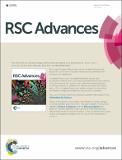Files in this item
Preparation of α-Fe2O3 hollow spheres, nanotubes, nanoplates and nanorings as high efficient Cr(VI) adsorbents
Item metadata
| dc.contributor.author | Liu, Zhong | |
| dc.contributor.author | Yu, Ruitao | |
| dc.contributor.author | Dong, Yaping | |
| dc.contributor.author | Li, Wu | |
| dc.contributor.author | Zhou, Wuzong | |
| dc.date.accessioned | 2017-08-22T23:32:28Z | |
| dc.date.available | 2017-08-22T23:32:28Z | |
| dc.date.issued | 2016-08-23 | |
| dc.identifier | 245326665 | |
| dc.identifier | e5226c82-d62f-4582-983e-095e9bade9ae | |
| dc.identifier | 84987615922 | |
| dc.identifier | 000384155100048 | |
| dc.identifier.citation | Liu , Z , Yu , R , Dong , Y , Li , W & Zhou , W 2016 , ' Preparation of α-Fe 2 O 3 hollow spheres, nanotubes, nanoplates and nanorings as high efficient Cr(VI) adsorbents ' , RSC Advances , vol. 6 , no. 86 , pp. 82854-82861 . https://doi.org/10.1039/C6RA15245G | en |
| dc.identifier.issn | 2046-2069 | |
| dc.identifier.other | ORCID: /0000-0001-9752-7076/work/58055019 | |
| dc.identifier.uri | https://hdl.handle.net/10023/11528 | |
| dc.description | This work was financially supported by the National Nature Science Foundation of China (No: 51302280, 51574286), Natural Science Foundation in Qinghai province (No: 2014-ZJ- 936Q). CAS "Light of West China" Program and Youth Innovation Promotion Association (2016377), CAS. | en |
| dc.description.abstract | α-Fe2O3 nanoparticle with different morphologies, such as hollow spheres, nanotubes with limited {0001} plane exposed, nanoplates and nanorings with the {0001} plane predominantly exposed, have been synthesised by using NaH2PO4 and urea in a facile hydrothermal method. The mechanism of the morphology evolution from hollow sphere to nanoring has been investigated. It is proposed that the polymerisation of Fe3+/H2PO4− plays an important role in the formation of these morphologies. The adsorption of Cr (VI) from aqueous solution onto these α-Fe2O3 nanoparticles showed that the α-Fe2O3 with nanoring morphology has the highest removal efficiency, and the adsorption capacity reached to 16.9 mg/g. These results indicate that the adsorption mechanism of Cr (VI) onto hematite nanoparticles is a chemisorption process through doubly and triply coordinated hydroxyl groups on the outer surface of α-Fe2O3. | |
| dc.format.extent | 8 | |
| dc.format.extent | 2349264 | |
| dc.language.iso | eng | |
| dc.relation.ispartof | RSC Advances | en |
| dc.subject | QD Chemistry | en |
| dc.subject | NDAS | en |
| dc.subject.lcc | QD | en |
| dc.title | Preparation of α-Fe2O3 hollow spheres, nanotubes, nanoplates and nanorings as high efficient Cr(VI) adsorbents | en |
| dc.type | Journal article | en |
| dc.contributor.institution | University of St Andrews. School of Chemistry | en |
| dc.contributor.institution | University of St Andrews. EaSTCHEM | en |
| dc.identifier.doi | 10.1039/C6RA15245G | |
| dc.description.status | Peer reviewed | en |
| dc.date.embargoedUntil | 2017-08-22 | |
| dc.identifier.url | http://www.rsc.org/suppdata/c6/ra/c6ra15245g/c6ra15245g1.pdf | en |
This item appears in the following Collection(s)
Items in the St Andrews Research Repository are protected by copyright, with all rights reserved, unless otherwise indicated.

